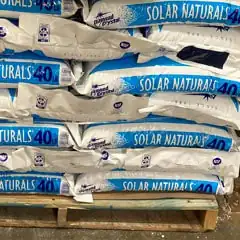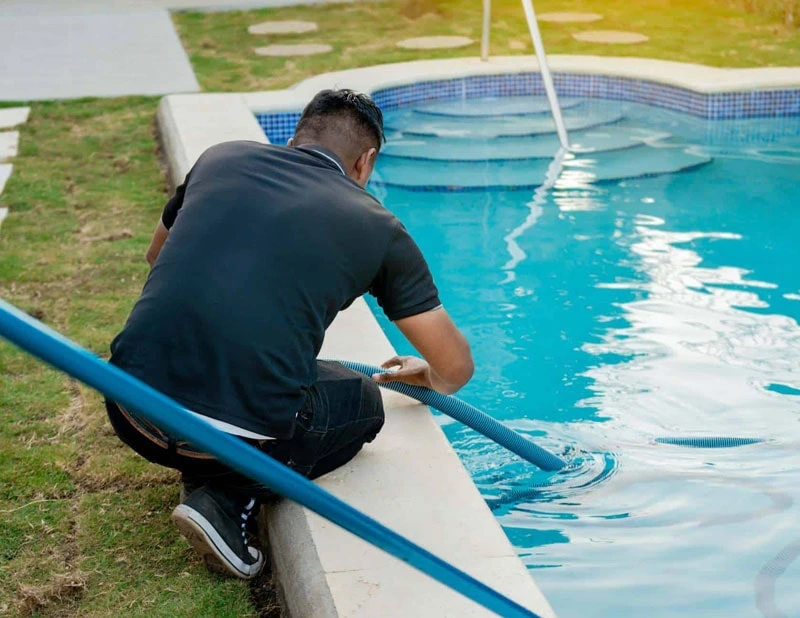When it comes to maintaining a saltwater pool, the type of salt you choose can make a significant difference in the overall performance and enjoyment of your swimming experience.
In this article, I’m going to unravel the mystery surrounding various pool salt types and their impact on saltwater pool sanitation.
Let’s dive deeper into the distinctions between solar salt and mined salt, as we shed light on the crucial factors that pool owners should consider when selecting the right salt for their pools.
Is all Pool Salt the Same?
Generally, it’s not the case all pool salt the same. While the primary chemical composition of pool salt is sodium chloride (NaCl), there can be differences in the purity and quality of the salt.
Pool salt should be specifically labeled as “pool salt” or “swimming pool salt” to ensure it is suitable for use in saltwater pools. It’s essential to use pool salt specifically designed for saltwater pools to ensure proper function and avoid potential issues.
Regular table salt or rock salt, for example, should not be used in saltwater pools as they may contain additives or impurities that could damage the salt chlorinator or cause other problems in the pool water.

What is Pool Salt?
Pool salt is a type of salt that is specifically designed for use in swimming pools. It is primarily made up of sodium chloride (NaCl), which is the same chemical compound found in table salt.
However, pool salt is different from table salt in that it is specially formulated to dissolve more easily in water and to work well with salt chlorine generators. To learn more about salt cells and how salt chlorine generators do their job, please see Saltwater Pools: How Much Salt For Proper Chlorination? where I describe how a salt cell works (and how to maintain pool water quality).
Pure sodium chloride is the main ingredient in pool salt. It is designed not to contain any additives or impurities that could harm your pool’s filter, flow equipment or the salt chloride cell itself. Other types of salt may contain additives that could be harmful to your pool or the people who swim in it.
Pool salt is available in both powdered and granular forms. Granular pool salt is more commonly used, as it dissolves easily in water and is easier to handle. Most pool supply stores sell pool salt in bulk, making it easy to purchase the amount you need for your pool. When you are first filling a pool, starting with fresh water, you will need quite a few 40lb bags of pool salt! You can find a saltwater pool salt calculator near the top of the article Saltwater Pools: How Much Salt For Proper Chlorination?
Types of Pool Salt
When it comes to pool salt, there are three main types: mined salt, mechanically evaporated salt, and solar salt. Each type has its own unique characteristics and benefits.
Mined Salt
Mined salt is exactly what it sounds like – salt that is extracted from existing salt deposits, usually underground mines. This type of salt is typically the least expensive option, but it can contain impurities that may affect the quality of your pool water. Mined salt is also often coarser than other types of pool salt, which can make it more difficult to dissolve.
Mechanically Evaporated Salt
Mechanically evaporated salt is produced by boiling seawater in large vats until the water evaporates, leaving behind salt crystals. This type of salt is generally of higher quality than mined salt, as it is more pure and contains fewer impurities. It is also finer and more easily dissolved than mined salt.
Sometimes, industrial processors of salt have salt deposits that are really deep underground. To extract the salt, they pump water down into the mine, let the salt dissolve into the water (creating brine) then they pump the water back up and do the same boiling process described above to evaporate the water. They will sometimes have methods that remove some of the impurities from the original mine salt during the process. The quality and grain size of the resulting salt are a function of the exact process used, but can produce a rather pure salt product. This whole process is usually called Vacuum Extraction, but you won’t necessarily see that on a bag of pool salt.
Solar Salt
Solar salt is produced by evaporating seawater using the power of the sun. This method is typically more expensive than mechanically evaporated salt, but it produces a higher quality salt that is free of impurities and dissolves easily. Solar salt is also considered to be more environmentally friendly than other types of pool salt, as it is produced using renewable energy sources.

Is Pool Salt Different from Table Salt?
While both pool salt and table salt primarily consist of sodium chloride (NaCl), they have distinct characteristics, such as additives and grain size that make them unsuitable for interchangeable use in certain situations.
When adding salt to your pool, it is important to use a pool grade option. This is because table salt may contain additives like iodine or anti-caking agents that can interfere with the pool’s chemistry and equipment. Pool salt is also usually less expensive than table salt when purchased in bulk.
So even if it seems like you could just use common table salt, or rock salt, or even water conditioning salt, don’t do it! Risking your salt cell integrity or the sanitation condition of your pool is just not worth it.
How Do Know What You’re Buying?
Pool salt manufacturers don’t always label their products with the production method used for making the salt or even the exact percentage of Sodium Chloride (NaCl). Sometimes you can find out by checking their website. In most cases, the best phrases you can look for are:
- ‘Compatible with Salt Chlorine Generators’ or even ‘Chlorine Generator Salt’
- ‘Additive Free’
- ‘High Purity’, ‘100% Pure’ , ‘Certified USP Grade salt’, and similar statements
One other thing that I try to be careful of, is that when I search on “pool salt” sometimes the search results also include water softening salt.
How Much Pool Salt Should I Buy?
Start by figuring out how much salt you need right now by using our Pool Salt Calculator. You’ll need a salt test kit or a salt test strip to determine the current concentration of salt in your water in parts per million (ppm).
Remember that when adding salt to your pool, it is important to disperse the salt as widely as possible to encourage the salt to dissolve quickly. Your salt generator cell manual will probably also provide tips about when to run the pump and other considerations.
Pool Salt Additives
When it comes to pool salt, there are some products that are formulated to be ‘easy all-in-one’ products, catering to the ‘just dump it in and be done with it’ market. Since one of the main variables in your water system is the original water that is available at your home, trying to anticipate how much added pH adjustment, alkalinity buffering or calcium increaser is needed is difficult to predict.
I would encourage you to just buy the purest plain ‘ole salt you can find, and avoid any additives. Then you can adjust the water quality based on the local water you are working with. For more about adjusting water quality and testing your water, see the article Saltwater Pools: How Much Salt For Proper Chlorination? where I cover that subject in some detail.
Here are some common types of additives that you may encounter when evaluating Saltwater Pool Salt:
Anti-Caking Agents
Anti-caking agents are added to pool salt to prevent the salt from clumping together. This can be helpful when storing the salt, as it prevents the salt from becoming hard and difficult to use. It also can make it easier on you when it is time to add amounts smaller when balancing the salt level in your pool while doing maintenance.
When adding salt to a pool, you are encouraged to spread it over as much surface area as possible, to speed up dissolving the salt and to avoid clogging your plumbing and salt cell with chunks of salt. So anti-caking can sound pretty good, but certain anti-caking agents can affect the performance of the salt, as they may interfere with the chlorination process. If you are using a salt chlorine generator, check your owner’s manual to see if the specific salt cell manufacturer provides guidelines about the salt that should be used with it.
Additives or Balancers
Additives for pH increasers or decreasers, alkalinity increasers, Stabilizers (Cyanuric Acid to retain chlorine), Calcium increasers are all possible things that a manufacturer might add to a product to make it enticing.
Other Factors in Pool Salt Selection
There are some other things that might sway you one way or another when selecting what pool salt that you want to use in your saltwater chlorine generator system.
Crystal Size
Pool salt with bigger crystals can dissolve more slowly than salt with smaller crystals. This can be helpful if you want to maintain a consistent level of salt in your pool over a longer period of time. Salt with bigger crystals may be less likely to clog up your chlorine generator, as it is less likely to form a solid mass.
If you are planning on buying in bulk to save some money, and are planning to store the unused bags, larger crystals may be less likely to solidify into clumps that are hard to break up and use later. For more on the topic of storing pool salt, see Don’t Make These Mistakes When Storing Pool Salt Outside.
Bag Size
Pool salt tends to be fairly uniformly packaged in 40 pound bags (a little over 18 kilograms). If you are like me, that big of a bag can be hard to maneuver. When initially filling a pool, 40 pounds per bag is probably the way to go, since even a small pool will need multiple bags, but when I am just balancing the salt level on a routine basis, working with a smaller bag is appealing. A few of the brands do offer 25 pound bags as an alternative.

Just for reference, a 40 pound salt bag measures about 20″ x 15″ x 4″ in size.
Buying Pool Salt in Bulk
Some pool salt products offer fairly decent discounts when you buy many bags at a time. Consider how much salt you currently need, how much you use over time and whether you have a good dry place to store the extra bags before committing to a pallet load of salt. Hmm, what are you going to do with that pallet afterwards? Ugh.
Buying Locally vs. Online
Pool salt is very heavy, considering how much of it you sometimes need. That can definitely swing the local vs. online decision to some place where you can just go pick some up locally.
The benefits of online, of course, is wider selection and having something heavy just delivered to your door. I like being able to choose what I like online, and perhaps sample one bag each of a few products that sound like they are good choices. After making my top pick, I then check around locally to see if I can find a steady source of the best pool salt for my situation.
Here are a few products to look at when starting your search for the perfect pool salt for your situation.
Morton's indicates that this pool salt is designed for salt chlorine generators, that it is additive-free, and describes the purity level as "high". This link takes you to a single 40 pound bag, but it is also available at a lower price when ordering multiple bags (Sorry! Amazon has not made this image available for display - but you will see it when you click through).
This 40 pound bag of salt from AquaSalt is a nice choice because it specifically says on the packaging that it is "Pool and Spa Chlorine Generator Salt" and also that it is "100% pure, certified USP-Grade". The form of salt is granular.
I had intended on providing a link to a Solar Salt alternative for your pool in this location, but I cannot find one right now that is both expressly formulated for pools and is really evaporated sea salt. I will update this section if I manage to find a good product that fits this criteria.
Is the Container Recyclable?
For (an amazing amount of) detail about recycling pool salt containers, see Breaking Down The Salt Container Recycling Conundrum.
Cost of Pool Salt
Type of pool salt, purity, package size, bulk buying and per bag (built in) delivery charges all will contribute to the final cost per bag of your salt. At the time of writing this article, the price of pool salt ranges from $13 to $29 per 40-pound bag. Some premium brands (especially with Solar Salt) may charge up to $40 for a 40-pound or smaller bag.
It’s important to note that while cheaper pool salt may seem like a good deal, it may contain impurities that can damage your pool equipment and cause other issues. It’s worth it to shop around to find the best balance between cost and a quality pool salt that will ensure the longevity of your pool and its equipment.
Table of Contents
Photo of solar salt production in France by Sébastien Goldberg.









